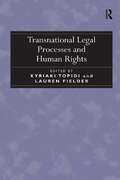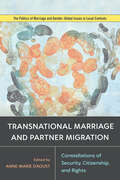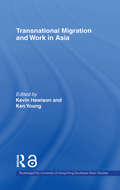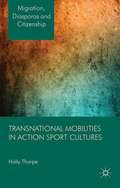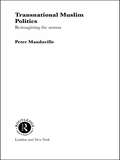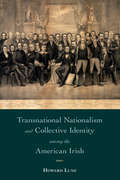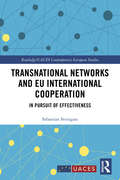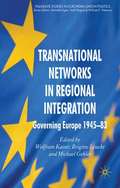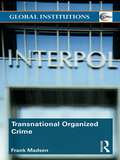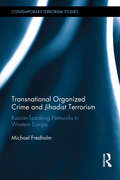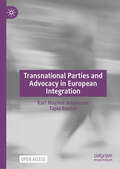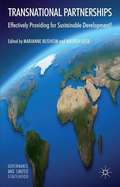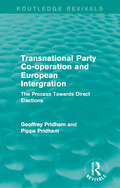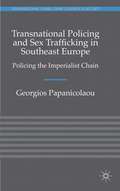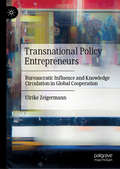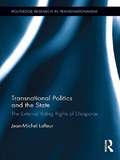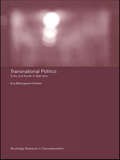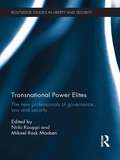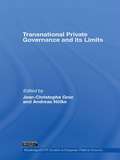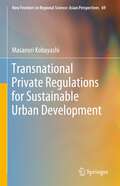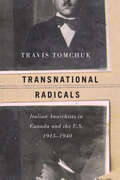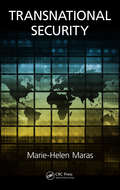- Table View
- List View
Transnational Legal Orders
by Terence C. Halliday Gregory ShafferThis book offers a pathbreaking, empirically grounded theory that reframes the study of law and society from a predominantly national context, which dichotomizes the study of international law and national compliance into a dynamic perspective that places national, international, and transnational lawmaking and practice within a coherent single frame. By presenting and elaborating on a new concept, transnational legal orders, this book offers an original approach to the emergence of legal orders beyond nation-states. It shows how they originate, where they compete and cooperate, and how they settle on institutions that legally order fundamental economic and social behaviors that transcend national borders. This original theory is applied and developed by distinguished scholars from North America and Europe in business law (corporate bankruptcy, transport of goods by sea, secured transactions law, and international taxation), regulatory law (monetary and trade, finance, food safety, and climate change), and human rights (rule of law, use of indicators regarding human rights treaties, trials of political leaders, right to health and access to medicines, and human trafficking).
Transnational Legal Processes and Human Rights
by Lauren FielderIt is becoming increasingly common for human rights norms to be transferred between legal and political systems and this book is a fresh approach to the intersection of transnational law and the protection of cultural difference beyond the single state border. It investigates how the construction and evolution of human rights norms are transferred in transnational legal settings and asks whether law should reflect, express or control any given aspect of culture. The chapters explore the ways that law and cultural identity may or may not co-exist, particularly in circumstances where a prima facie clash is observed. Examining legal approaches to cultural differences from a comparative perspective and across a wide range of locations, the book covers topics such as juvenile punishment, religious defamation, religious rights and conflict between industry and indigenous communities. It will be of value to those working in the areas of transnational and comparative law, as well as those concerned with human rights and the intersection of law and cultural difference.
Transnational Lives in China
by Angela LehmannIncreasing numbers of people from Western nations are leaving home to work within the developing economies of Asia. Here, Angela Lehmann explores a second-tier city in China and uses sociological theory to understand the impact of global mobility on identity, community and belonging.
Transnational Marriage and Partner Migration: Constellations of Security, Citizenship, and Rights (Politics of Marriage and Gender: Global Issues in Local Contexts)
by Pardis Mahdavi Eithne Luibhéid Rhacel Salazar Parrenas Ji-Yeon Yuh Laura Odasso Saskia Bonjour Audrey Macklin Helena Wray Massilia Ourabah Anne-Marie D'Aoust Betty De Hart Grace Tran Kerry Abrams Daniel Pham Manuela Salcedo Mieke VandenbrouckeThis multidisciplinary collection investigates the ways in which marriage and partner migration processes have become the object of state scrutiny, and the site of sustained political interventions in several states around the world. Covering cases as varied as the United States, Canada, Japan, Iran, France, Belgium or the Netherlands, among others, contributors reveal how marriage and partner migration have become battlegrounds for political participation, control, and exclusion. Which forms of attachments (towards the family, the nation, or specific individuals) have become framed as risks to be managed? How do such preoccupations translate into policies? With what consequences for those affected by them, in terms of rights and access to citizenship? The book answers these questions by analyzing the interplay between issues of security, citizenship and rights from the perspectives of migrants and policymakers, but also from actors who negotiate encounters with the state, such as lawyers, non-governmental organizations, and translators.
Transnational Migration and Work in Asia (Routledge/City University of Hong Kong Southeast Asia Series #Vol. 5)
by Ken Young Kevin HewisonFocusing on the issues associated with migrating for work both in and from the Asian region, this book sheds light on the debate over migration and trafficking. With contributions from an international team of well-known scholars, the book sets labour migration firmly within the context of globalization, providing a focused, contemporary discussion of what is undoubtedly a major twenty-first century concern. Transnational Migration and Work in Asia analyzes workers motivations and rationalities, highlighting the similarities of migration experiences throughout Asia. Presenting in-depth case studies of the real-life experiences and problems faced by migrant workers, the book discusses migrants’ relations with the state and their vulnerability to exploitation, as well as the major policy issues now facing governments, employers, NGOs and international agencies.
Transnational Mobilities in Action Sport Cultures
by Holly ThorpeThis book contributes to recent debates in transnationalism, mobilities and migration studies by offering the first in-depth sociological examination of the global phenomenon of action sports and the transnational networks and connections being established within and across local contexts around the world.
Transnational Muslim Politics: Reimagining the Umma (Routledge Research in Transnationalism #Vol. 2)
by Peter G. MandavilleThis book analyzes Islam as a form of 'travelling theory' in the context of contemporary global transformations such as diasporic communities, transnational social movements, global cities and information technologies. Peter Mandaville examines how 'globalization' is manifested as lived experience through a discussion of debates over the meaning of Muslim identity, political community and the emergence of a 'critical Islam'.This radical book argues that translocal forces are leading the emergence of a wider Muslim public sphere. Now available in paperback, it contains a new preface setting the debates in the context of September 11th.
Transnational Nationalism and Collective Identity among the American Irish
by Howard LuneIn Transnational Nationalism and Collective Identity among the American Irish, Howard Lune considers the development and mobilization of different nationalisms over 125 years of Irish diasporic history (1791–1920) and how these campaigns defined the Irish nation and Irish citizenship. Lune takes a collective approach to exploring identity, concentrating on social identities in which organizations are the primary creative agent to understand who we are and how we come to define ourselves. As exiled Irishmen moved to the United States, they sought to create a new Irish republic following the American model. Lune traces the construction of Irish American identity through the establishment and development of Irish nationalist organizations in the United States. He looks at how networks—such as societies, clubs, and private organizations—can influence and foster diaspora, nationalism, and nationalist movements. By separating nationalism from the physical nation, Transnational Nationalism and Collective Identity among the American Irish uniquely captures the processes and mechanisms by which collective identities are constructed, negotiated, and disseminated. Inevitably, this work tackles the question of what it means to be Irish—to have a nationality, a community, or a shared history.
Transnational Neofascism in France and Italy
by Andrea MammoneThis book describes the establishment, evolution, and international links of the extreme right in one of the main Western European areas. Andrea Mammone details the long journey in the development of right-wing extremism in France and Italy, emphasizing the transfer, exchange, and borrowing of ideals, personnel, and strategies and the similarities among neofascist movements, activists, and thinkers across national boundaries from 1945 to the present day - including the Cold War years, the election of the European Parliament in 1979, and the 2014 EU elections. Mammone analyzes the adaptation of neofascism in society and politics; the building of international associations and pan-national networks; and the right-leaning responses to the defeat of fascism, European integration, decolonization, the events of 1968, immigration, and the recent EU-led austerity politics. As a book implicitly on space, borders, and belonging, it shows how some nationalisms may embody a transnational dimension and, at times, even pan-European stances.
Transnational Networks and EU International Cooperation: In Pursuit of Effectiveness (Routledge/UACES Contemporary European Studies)
by Sebastian SteingassThis book provides a timely evaluation of the EU’s ability to act internationally and coordinate policy in a time when it also seeks to meet shifting demands of international cooperation. These include global sustainable development, the challenge of multilateralism and the changing geopolitical order. Analysing the networks of officials and policy professionals in EU development policy, the book yields theoretical insights into dominant processes that characterise EU governance in international cooperation and assesses their role for policy coordination. Overall, this book concludes that EU policy coordination evades intergovernmental control and demonstrates how the agency of EU institutions depends on efforts of member state officials to defend their priorities and identities. Finally, it shows the need to better understand the EU as a collective international actor, beyond the widespread concern with institutional adjustments, which continuously fail to produce the intended outcomes. This text will be of key interest to scholars and students of European and EU politics, EU foreign policy, EU external relations and more broadly to international relations and international development.
Transnational Networks in Regional Integration
by Wolfram Kaiser Brigitte Leucht Michael GehlerShows that networks in European integration governance were not a phenomenon that developed in the 1980s out of a 'hollowing out' of the nation-states in the 1970s. Based throughout on newly accessible sources, the authors discuss various networks and show how they contributed to constitutional choices and policy decisions after World War II.
Transnational Organized Crime
by Frank MadsenWith organized crime estimated to generate billions of dollars every year through illegal activities such as money laundering, smuggling of people and goods, extortion, robbery, fraud and insider trading, authorities are increasingly working together to combat this increasing threat to international security and stability. In this book former police officer Frank Madsen provides a much needed, short and accessible introduction to transnational organized crime, explaining its history and the key current issues and clearly examining the economics and practices of crime in the era of globalization. Key issues discussed include: the war on drugs anti-money laundering efforts the relationship between organized crime and terrorism development of ‘Internet based’ criminal activity international response to transnational organized crime. Illustrated by a series of researched case studies from around the world, Transnational Organized Crime is essential reading for all students and researchers in International Relations, International Law and Criminology.
Transnational Organized Crime and Jihadist Terrorism: Russian-Speaking Networks in Western Europe (Contemporary Terrorism Studies)
by Michael FredholmThis book describes and analyzes the convergence of transnational organized crime and jihadist terrorism that has taken place within Russian-speaking social networks in Western Europe. Studies have shown that while under certain circumstances links between criminal organizations and terrorist groups appear, these are usually opportunistic and temporary in nature. Only rarely do they develop into something deeper and transformative, a convergence between crime and terrorism. This book reveals that Russian-speaking transnational organized crime and jihadist terrorism pose a serious threat to security and constitute a major challenge for law enforcement. Through their links with transnational organized crime, Russian-speaking jihadist networks from the Caucasus and Central Asia have easier access to weaponry, commercial explosives, and forged IDs than many other jihadist networks. Being in effect an integral component of transnational organized crime, the Russian-speaking jihadists can be assessed as potentially more capable than many other jihadists. The book assesses the effects of terrorism and organized crime on Russian-speaking diasporas in Western Europe and examines the implications for counterterrorism as well as policing on how to counteract the illegal activities of these networks. Drawing on Swedish court cases the work shows that an additional, and sometimes more effective way, to fight terrorism is by focusing on the non-terrorist types of crime perpetrated by terrorists. This book will be of much interest to students of terrorism and counter-terrorism, political violence, criminology, security studies and IR in general.
Transnational Parties and Advocacy in European Integration
by Tapio Raunio Karl Magnus JohanssonThis book analyses the role of Europarties in the deepening of integration and the debates on the future of Europe. It is guided by three fundamental research questions: What strategies do Europarties utilize to advance their visions of Europe? What is the relative influence of the actors in the networks of the Europarties? How successful have the Europarties been in shaping the future of Europe? European integration cannot be understood without accounting for the impact of the Europarties. Theoretically, the book utilizes the concepts of advocacy and agenda-setting, identifying Europarties as transnational partisan actors operating at intergovernmental and supranational levels of EU decision-making. Europarties have consolidated their organizational structures, and more importantly, have over the decades built their own networks and coalitions that enable them to wield influence in ways rarely captured by previous studies. Empirically, the book investigates the networks and positions of the Europarties, constitutional reform processes, and the role of the Europarties and their EP political groups in the broader debates on the future of Europe.
Transnational Partnerships
by Marianne Beisheim Andrea LieseWhy are some transnational public-private partnerships (PPPs) highly effective, while others are not? The contributors compare 21 transnational PPPs that seek to provide collective goods in the field of sustainable development.
Transnational Party Co-operation and European Integration: The Process Towards Direct Elections (Routledge Revivals)
by Geoffrey Pridham Pippa PridhamIn this book, first published in 1981, the authors trace and analyse the growth of transnational party co-operation and the factors important to it during the years before and immediately following direct elections. They recognise three major dimensions of transnational co-operation: the Euro-parliamentary groups; the new European party federations; and the national party frameworks in the member states. This title will be of interest to academics and students concerned with European affairs.
Transnational Policing and Sex Trafficking in Southeast Europe
by Georgios PapanicolaouMounting a vigorous critique on existing approaches to transnational policing, thisbook lays out an argument situating transnational policing within contemporary transformations of the capitalist state and imperialism. Focusing on aparticular case of regional police cooperation against sex trafficking in Southeast Europe, the study shows how contemporary dominant discourses on sex trafficking ultimately facilitate the implementation of new aggressive state strategies against migration and migrant workers and legitimise new police powers and operational capabilities at an international scale. "
Transnational Policy Entrepreneurs: Bureaucratic Influence and Knowledge Circulation in Global Cooperation
by Ulrike ZeigermannThis book explains how transnational policy entrepreneurs have contributed to the transfer of the contested concept of ‘Policy Coherence for Sustainable Development’ (PCSD) in global policy. Tracing the processes by which the PCSD concept has been diffused in an international epistemic community linked to the EU and the OECD, the book offers new insights on international public administrations’ influence on global decision-making. It highlights the dynamic and multi-directional character of knowledge circulation in policy transfer. Drawing on case studies from France, the United Kingdom and Germany, the book contributes to current debates on sustainable development, revealing the role of actors and the logics behind ‘policy coherence’. Thus, it allows to understand the challenges involved in implementing SDG 17. Given its scope, the book will be of considerable interest to academic audiences and students of international relations and policy analysis, as well as practitioners and public officials whose work involves global sustainability policy.
Transnational Politics and the State: The External Voting Rights of Diasporas (Routledge Research in Transnationalism #27)
by Jean-Michel LafleurIn just two decades, the number of states that have adopted external voting policies has boomed. Today, these policies, which allow emigrants to take part in home country elections from abroad, are widely found in Europe and Latin America. Looking at the cases of Italy, Mexico, and Bolivia, this book examines the motivations and consequences for states that enfranchise citizens abroad. This analysis sheds light on the impact of emigrants in home country politics, the motivations for emigrants to take part in the elections of a country where they no longer reside, and the consequences of this practice on receiving societies. With a multi-disciplinary approach, this book will appeal to scholars and students of sociology, political science, legal studies, international relations, migration, and transnationalism.
Transnational Politics: The case of Turks and Kurds in Germany (Routledge Research in Transnationalism)
by Eva Ostergaard-NielsenUsing the Turkish and Kurdish communities in Germany as a case study, this book offers a unique analysis of trans-state political loyalties and activities of transnational communities and their political ramifications at both national and international levels.
Transnational Power Elites: The New Professionals of Governance, Law and Security (Routledge Studies in Liberty and Security)
by Mikael Rask Madsen Niilo KauppiThis book argues that European Union institutional mechanics and the EU as a political unit cannot be properly understood without taking into account the elites that make the policy decisions. Spurred by globalisation, technological and economic development has provided the backbone for social and political transformations that have changed the social structures that unite and differentiate individuals and groups in Europe and their interface with extra-European actors. These developments are not only exemplified by the rise of the EU, but also by the rise of a set of transnational European power elites evolving in and around the European construction. This book maps out these EU and international interdependencies and provides a comprehensive picture of the European transnational power elites. Moving away from the majority of literature on European integration dominated by economics, law, IR and political science, the volume is written from a sociological perspective that takes into account the individuals that make the policy decisions, the formal and informal groups in which s/he is included, as well as the social conventions that regulate political and administrative activities in the EU. This book will be of much interest to students of EU studies, sociology, critical security studies, and IR in general.
Transnational Private Governance and its Limits (Routledge/ECPR Studies in European Political Science #Vol. 51)
by Andreas Nölke Jean-Christophe GrazThis volume explores a variety of forms of transnational private governance where non-state actors cooperate across borders to establish rules and standards accepted as legitimate by other agents. Transnational private governance is a core feature of the devolution of power that we observe in the global realm and that is bringing about new forms of authority. Transnational Private Governance provides theoretically and empirically informed insights into the interactions between states and non-state actors including domains beyond intergovernmental organizations, conventional non-governmental organizations, and multinational enterprises, covering a wide range of arrangements, from highly formal devolutions of power to lax and informal platforms of interaction between private actors. Contributing to the latest generation of globalization studies, the authors consider the relationship between states and markets as closely integrated and seek to broaden the scope of enquiry by including new patterns and agents of change on a transnational basis. This book will be of great interest to researchers and students of political science, international political economy, economics, business studies, globalisation and law.
Transnational Private Regulations for Sustainable Urban Development (New Frontiers in Regional Science: Asian Perspectives #69)
by Masanori KobayashiThis book analyzes the mechanism of transnational private regulations (TPRs) in the global property investment market and the conditions of their effectiveness for sustainable urban development. In the present economy, with control over national legislation alone, state policymakers have been challenged to regulate transnational investors, markets, and issues such as global warming, financial crises, food safety risks, deforestation, and cross-border business transactions. Transgovernmental networks of regulators have assembled representatives and technical experts from national regulatory agencies, nongovernmental organizations, private firms, and business organizations. As private corporations become increasingly globalized, many forms of TPRs have emerged since the 1990s for legislation, standard-setting, monitoring of compliance, and implementation of transnational rules, to respond to challenges posed by the transformation of domestic and international regulatory environments. TPRs are self-regulated, non-state, market-driven regulations. Since the emergence of TPRs, the global rule-making landscape has become dynamic. Urban development and property investment have been viewed historically as local phenomena: The regulations and standards in this field have been established and enforced by governments, local associations, and national professional bodies. However, as urban development and property investment increasingly have been globalized, the services, transactions, and investments by private firms have transcended national boundaries. For this reason, it has become difficult for states to regulate global activities through existing national legislation or international regulatory systems. As the management of new transnational issues through collaborations between various actors is unpredictable, it is necessary to examine the mechanism of TPRs in global property investment and their effectiveness for sustainable urban development.
Transnational Radicals: Italian Anarchists in Canada and the U.S., 1915-1940
by Travis TomchukItalian anarchism emerged in the latter half of the nineteenth century, during that country’s long and bloody unification. Often facing economic hardship and political persecution, many of Italy’s anarchists migrated to North America. Wherever Italian anarchists settled they published journals, engaged in labour and political activism, and attempted to re-create the radical culture of their homeland. Transnational Radicals examines the transnational anarchist movement that existed in Canada and the United States between 1915 and 1940. Against a backdrop of brutal and open class war—with governments calling upon militias to suppress strikes, radicals thrown in jail for publicly speaking against capitalism and the church, and those of foreign birth being deported and even executed for political activities—Italian anarchism was successfully transplanted. Transnationalism made it more difficult for states to destroy groups spread across wide geographical spaces. In Italy and abroad the strong anarchist identity informed by class, ethnicity, and gender reinforced movement values, promoted movement expansion, and assisted mobilization during times of crisis. In Transnational Radicals, Tomchuk makes use of Italian government security files and Italian-language anarchist newspapers to reconstruct a vibrant and little-studied political movement during a tumultuous period of modern North American history.
Transnational Security
by Marie-Helen MarasGlobalization and the easy movement of people, weapons, and toxins across borders has transformed security into a transnational phenomenon. Preventing transnational security threats has proven to be a very difficult challenge for governments and institutions around the world. Transnational Security addresses these issues, which are at the forefront

